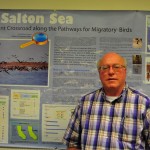Doug Barnum – Presentation 2

Salton Sea: Scientific triage for restoring a saline lake
Doug Barnum, USGS, La Quinta, CA, Kent Nelson, Dept. of Water Resources, Sacramento, CA, and H.L. Case III, USGS, La Quinta
Degradation of the Salton Sea, California’s largest lake, has been the subject of scientific interest for over 40 years. In particular, the deaths of thousands of migratory birds in the late 1990’s brought about a renewed interest and launched the modern era of integrated scientific investigations. These studies were intended to lay the framework for a comprehensive solution to the myriad of problems at the Salton Sea. A Research Needs workshop held in 1996, involving over 100 scientists and engineers, yielded a document recommending scientific strategies for investigating biological and physical environments, cultural resources, pathogens and diseases of wildlife, and contaminants. This document and a USGS Tiger Team report in 1999 set the stage for establishing a dedicated Science Office to provide management liaison to the scientific community, oversight of science investigations, coordination of peer review, and information synthesis. Under the auspices of the independent Science Office, expert working groups used these reports to address each topic, developed issues for investigation, and then ranked them in order of importance. A larger advisory committee of scientists and managers then provided a higher-level prioritization. Management acted on these recommendations to provide funding and support for science.
Studies stemming from the initial science needs recommendations provided options for addressing seemingly competing objectives, and provided methods for resolving and mitigating long-standing systemic degradation of the Salton Sea. Importantly, science in planning for this ecosystem restoration was integrated and interactive – adaptive. An adaptive management approach restoration planning provided a central role for science in monitoring progress toward goals, redirecting action based on results of studies , and refining the plans. This talk will explore the role of adaptive science interaction with management in evaluating and developing options for the Salton Sea with particular emphasis on selenium, hydrogen sulfide, thermoclines, and fugitive dust.

